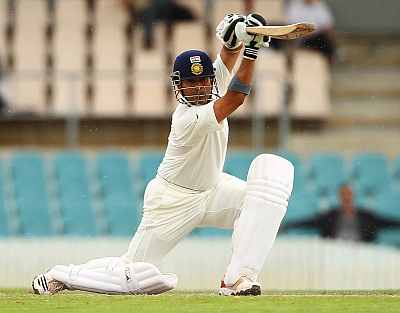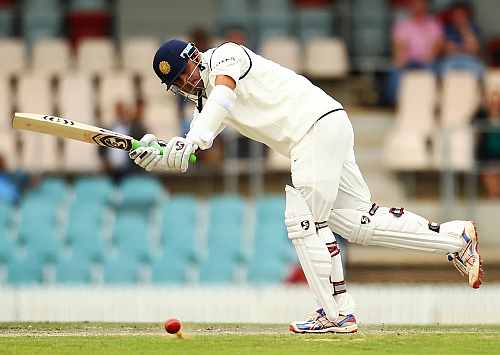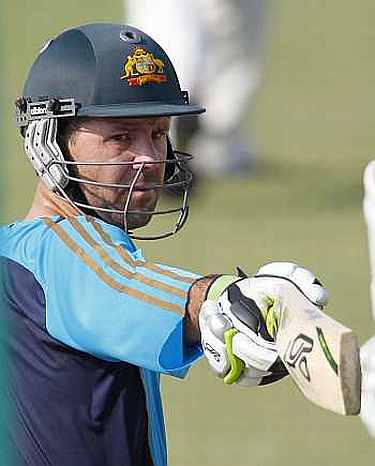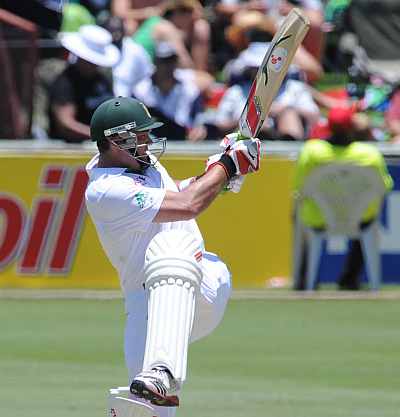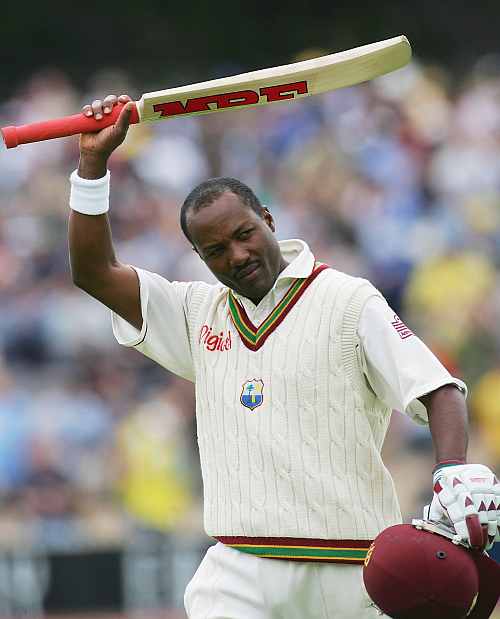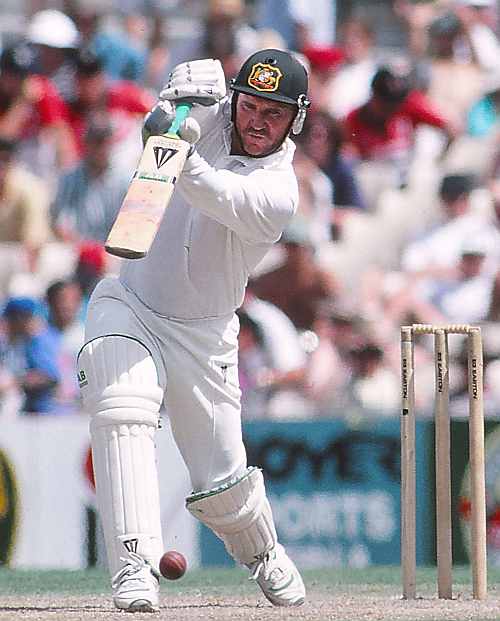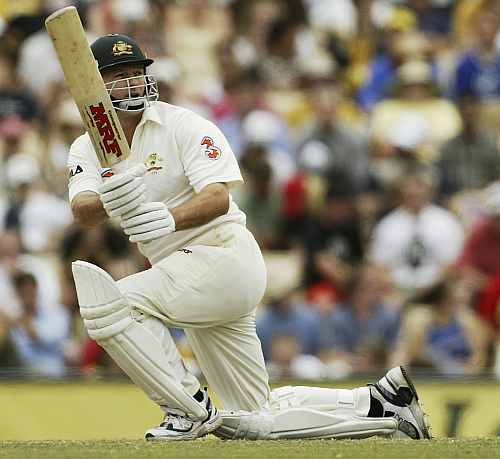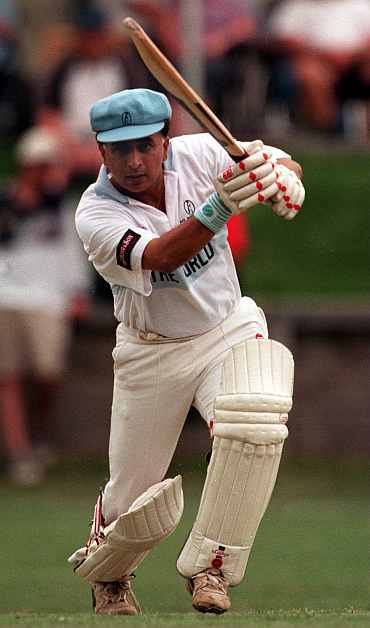 | « Back to article | Print this article |
Meet Test cricket's 10,000 runs club
When Sunil Gavaskar scaled the 10, 000-run mark, he must have felt he conquered Mount Everest.
He was the first cricketer to go past the milestone, and reaching the landmark at that time was as good as reaching the stars.
But, since then, there have been many who have gone past 10,000 runs, thanks to the number of games being placed nowadays and the heavy bats that bring runs aplenty.
So what makes the 10,000 club so special?
Well, for starters, there are some elite names in the club, which includes Sachin Tendulkar, Jacques Kallis, Rahul Dravid, Brian Lara, Ricky Ponting... the list goes on. All of them, like Gavaskar, were the torchbearers of their respective teams and have made an impact in the longer version of the game.
Manu Shankar and Rajneesh Gupta present the members of the elite field.
Sachin Tendulkar
Undeniably the greatest batsman the world has seen. He sits atop the table with 15,183 runs, and 51 centuries to his name.
From the point he made his debut in 1989, against archrivals Pakistan, the Master Blaster was always destined for glory. On a threshold of another milestone -- his 100th hundred -- Tendulkar's batting record in one to envy.
He is the first male player to score a double century in ODI cricket. In 2002, Wisden ranked him the second greatest Test batsman of all time, behind Donald Bradman, and the second greatest one-day-international (ODI) batsman of all time, behind Viv Richards.
His highest score is 241, which he scored in 2004, against Bangladesh in Mirpur.
Matches: 184
Innings: 303
Runs: 15183
Highest score: 248
Average: 56.03
100/50: 51/63
Meet Test cricket's 10,000 runs club
Rahul Dravid
He is known as 'The Wall', and true to his name is the go-to man for Indian cricket. Having lived in the shadow of Indian greats like Sachin Tendulkar, Sourav Ganguly, Dravid has carved a niche for himself in Test cricket.
He made his Test debut in 1996 along with Sourav Ganguly, against England, where he missed a century by just four runs. He is only the second Indian batsman, after Sachin Tendulkar, and the third international player to reach 12,000 runs in Test cricket, and the only batsman to score a century in all ten Test-playing nations.
Besides this, Dravid is also a partnership guy. He was involved in more than 80 century partnerships with 18 different partners, and holds the world record of having the maximum partnerships with Sachin Tendulkar -- 19 overall.
Earlier this year, he became the second international player to score 13,000 runs in Tests.
He stroked a masterful 270 -- his highest score in Test cricket -- against Pakistan in Rawalpindi to help India to a famous win.
Matches: 160Innings: 278
Runs: 13094
Highest score: 270
Average: 53.23
100/50: 36/62
Meet Test cricket's 10,000 runs club
Ricky Ponting
Successful captain, leading run-scorer for Australia, second in all-time century-makers list, Ricky Ponting is one of the finest players of the modern era.
Nicknamed 'Punter', Ponting made his Test debut in 1995, against Sri Lanka in Perth, and since then has not lot looked back.
He had critics gunning for his head from time to time, but fought hard and let the bat do the talking.
He took over from Steve Waugh and led Australia to a phenomenal run. During India's tour Down Under, Ponting scored double centuries in back-to-back Tests -- first in the second Test at Adelaide, where he hit 242, then followed it up in Melbourne, where he walloped 257 -- which also happens to be his highest score in Tests.
Such was Ponting's form that at one time he was chasing Tendulakr's record of maximum centuries, although the latter has charged ahead of him lately.
Matches: 158
Innings: 270
Runs: 12656
Highest score: 257
Average: 52.30
100/50: 39/58
Meet Test cricket's 10,000 runs club
Jacques Kallis
Jacques Kallis is arguably the best all-rounder to play the game. A master of all three versions of the game, Kallis is consistent with the bat, ball and on the field.
Such was his consistency that from October to December 2007 that he produced a streak of five centuries in four Test matches; with a century in the second innings of the third Test against India, his 40th, he moved past Ricky Ponting to become the second highest scorer of Test centuries.
He is the only cricketer in the history of the game to hold more than 11,000 runs and 250 wickets in both One-day internationals and Tests.
Besides four consecutive centuries, Kallis also holds the record for the fastest half-century, as measured by balls faced, in Test cricket history, scoring 50 against Zimbabwe off only 24 balls.
In 2007, he scored five centuries in four Tests, making him just the fourth man, after Bradman, Ken Barrington and Matthew Hayden, to score four centuries in four Tests on two different occasions.
Making his debut against England in 1995, Kallis has amassed 12,036, with a highest score of an unbeaten 201 -- which he scored on the third day of the first Test against India in January this year.
Matches: 148
Innings: 251
Runs: 12036
Highest score: 201
Average: 56.77
100/50: 40/55
Meet Test cricket's 10,000 runs club
Brian Lara
Brian Charles Lara, the best left-handed batsman of the modern era. He holds the record for highest individual Test score of 400 not out against England in 2004.
Lara is the only batsman in the history of cricket to scored a hundred, a double century, a triple century, a quadruple century and a quintuple century in first class games over the course of a senior career.
Besides this he also holds the Test record of most number of runs in a single over in a Test match, when he aggregated 28 runs in an over by Robin Peterson of South Africa in 2003.
The elegant southpaw made his Test debut against Pakistan in 1990 and was the mainstay of the West Indies' batting line-up in the early 90s and late 2000s.
Lara announced his retirement from all forms of the game in 2007, although many still believe that he still had couple of years left in him.
Wisden 100 rates Lara's 153 not out against Australia in Bridgetown in 1998�� as the second best innings ever after Sir Donald Bradman's 270 against England in Melbourne in 1936��.
Matches: 131
Innings: 232
Runs: 11953
Highest score: 400
Average: 52.89
100/50: 34/48
Meet Test cricket's 10,000 runs club
Allan Border
When Allan Border retired, he was Australia's most capped player and leading run-scorer in both Tests and ODIs. His Australian record for Test match runs stood for 15 years before Ricky Ponting overtook him in July 2009.
The beefy left-hander holds the record for the number of consecutive Test appearances and the number of Tests as captain.
Not surprisingly, he made his debut against England and soon rose to prominence with two consecutive centuries in grade cricket, which earned him a place in place in the New South Wales team.
Since then he doubled his skills as an efficient left-arm spinner and proved quite effective in the shorter version of the game. In 1981, he made his first Ashes tour and scored a half-century in each of the first two Tests.
Border batted with a fractured left finger to hit the slowest Test hundred by an Australian, and remained unbeaten on 123.
Then, again, in the final Test, the south paw scored 106 not out and 84.
During this latter sequence, he defied the English bowlers for more than 15 hours to score 313 runs before he was dismissed. Such was his show that Sir Leonard Hutton called him the best left-handed batsman in the world.
Under Border, Australia registered many victories outside their country. He played his last Test against South Africa in 1994, finishing on a high, with as many as 11174 runs, with a highest score of 205, which he scored against New Zealand.
Matches: 156
Innings: 265
Runs: 11174
Highest score: 205
Average: 50.56
100/50: 27/63
Meet Test cricket's 10,000 runs club
Steve Waugh
A people's captain, Steve Waugh was one of the most popular skippers of his era.
A staunch cricketer who fought his way in the middle, Waugh started his career as a bowler who could bat a bit. He made his Test debut against India in 1985 , where in he scored 13 and five and also took 2-36 in the first innings.
A consistent performer, Waugh had a sound cricketing brain, always delivered when the chips were down. At one point he was ranked No. 1 Test batsman.
He scored an unbeaten 112 as Australia defeated Pakistan in the first Test at Brisbane and scored 200 runs at 50.00 for the 1995-96 series.
Suffering an injury in December, he missed the first Test against Sri Lanka and part of the triangular ODI tournament, then returned for the Boxing Day Test at Melbourne to score 131 not out.
Waugh took over captaincy from Mark Taylor and led Australia to a world record of 16 consecutive Test victories before they were stopped by India in 2001.
Matches: 168
Innings: 260
Runs: 10927
Highest score: 200
Average: 51.06
100/50: 32/50
Meet Test cricket's 10,000 runs club
Sunil Gavaskar
Known as the Little Master, Sunil Gavaskar was perhaps India's greatest opening batsman.
A sound technique, he played in the West Indies era when the likes of Malcom Marshalls, Joel Garners and Michael Holdings were terrorizing the entire world with their pace and skill.
The diminutive batsman made his debut against the West Indies and scored 61 and 67 not out in the second Test at Port of Spain.
In the next Test, he hit his maiden Test century and followed it up with another one in Barbados.
He is the first Indian to score four centuries in one Test series, the second Indian after Vijay Hazare to score two centuries in the same Test, and the third after Hazare and Polly Umrigar to score centuries in three consecutive innings.
He was the first Indian to aggregate more than 700 runs in a series, and these 774 runs at 154.80 remains the most runs scored in a debut series by any batsman.
Gavaskar retired in 1987 after playing the Test against Pakistan. His highest score was 236 – which was the highest by an Indian, before VVS Laxman bettered it in 2001.
Matches: 125
Innings: 214
Runs: 10122
Highest score: 236
Average: 51.12
100/50: 34/45
